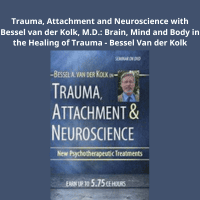Course Content Summary
This transformative course, “Trauma, Attachment and Neuroscience with Bessel van der Kolk, M.D.: Brain, Mind and Body in the Healing of Trauma,” offers a comprehensive exploration of traumatic stress and its profound impact on the developing brain, mind, and body. Led by Dr. Bessel van der Kolk, a globally recognized expert and author of the New York Times bestseller The Body Keeps the Score, this program integrates cutting-edge neuroscience with attachment research to present innovative and effective treatment approaches for children and adults. Participants will gain a deep understanding of how trauma is stored in the body and brain, and learn practical strategies for fostering self-regulation, processing traumatic memories, and restoring a sense of safety and aliveness.
Target Audience
This course is ideal for:
- Mental health professionals (psychologists, psychiatrists, therapists, counselors, social workers)
- Medical practitioners and healthcare providers
- Educators and school personnel
- Researchers in psychology, neuroscience, and trauma studies
- Anyone interested in a deeper understanding of trauma, its effects, and pathways to healing, including individuals seeking personal growth and knowledge.
Main Content
The course delves into key areas, including:
- Neuroscience of Trauma: Understanding how traumatic experiences reshape brain wiring, affecting areas responsible for pleasure, engagement, control, and trust.
- Attachment and Development: Exploring the critical role of secure attachment in healthy development and how disruptions can lead to complex trauma and maladaptive coping.
- The Body Keeps the Score: Examining the somatic re-experiencing of trauma and how the body holds traumatic imprints, leading to physical and emotional symptoms.
- Innovative Treatment Modalities: A comprehensive overview of various evidence-based and emerging therapeutic interventions, such as:
- Neurofeedback
- Somatic experiencing and body-based therapies
- Eye Movement Desensitization and Reprocessing (EMDR)
- Internal Family Systems (IFS)
- Psychodrama and play therapy
- Yoga and other movement-based practices
- The role of compassion-focused therapy and imagery work.
- Affect Regulation & Self-Awareness: Strategies to help clients regulate their emotions, enhance self-awareness, and befriend physical sensations associated with trauma.
- Integration and Resilience: Methods for integrating dissociated aspects of experience, overcoming helplessness, and building resilience to cultivate a full and engaged life in the present.
- Case Studies and Practical Applications: Real-world examples and practical tools to apply the learned concepts in clinical practice or for personal understanding.
Learning Objectives
Upon completion of this course, participants will be able to:
- Determine how traumatic experiences and disruptions of secure attachment influence brain development.
- Examine methods to help clients process traumatic memories to aid in recovery and build resilience.
- Summarize the impact of trauma on self-awareness and self-regulation.
- Differentiate between trauma de-sensitization, integration, and growth in the context of trauma treatment.
- Demonstrate strategies to help traumatized clients regulate their emotions and integrate physical sensations.
Transform your understanding and approach to trauma. Enroll now to learn from a pioneer in the field!
SIGN UP NOW







